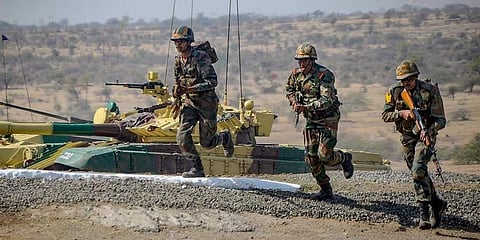

NEW DELHI: The Indian Army on Monday issued two requests for proposals (RFP) for fast-track procurement of 7,000 body-worn cameras (BWC) and 1,612 body shields with harness under emergency procurement.
The BWC is a small, audio/video recording device worn usually on the chest over the uniform to capture real time footage of a live operation. Whereas, the body shield is to protect the soldier and should have ambidextrous design and not weigh more than 21 kgs with a service life of five years. Both are to be procured through fast-track procedure. While the camera systems will be procured under the ‘Buy Indian’ category, the body shields would be under the ‘Buy Indian IDDM’.
The process of the fast-track procedure was started to meet the requirement of the equipment and systems which are urgently required by the forces. The Indian Army had recently issued RFPs for drones, loitering munitions and ballistic helmets.
The emergency procurement has been done under the financial powers given by the Ministry of Defence under which they can clear procurements up to Rs 300cr without any further clearance. There had been three occasions when the Army used the emergency procurement; in 2016, post Uri surgical strike, in 2019, Balakot strike and in 2020, during the standoff with China in Eastern Ladakh. 68 contracts worth Rs 6,000 were executed during this period. The fourth cycle of the EP is underway as told by General MK Pande recently.
For both procurements the prospective bidders have to submit their proposals by December 20.
As per the Ministry of Defence the aim of the fast-track procedure is to ensure expeditious procurement for urgent operational requirements of the Armed Forces such as war, border security and critical situations. Fast track procedures may also be applied for cases where timelines of the normal prescribed procedure in procuring of operationally critical equipment is seen to be adversely impacting the capability and operational preparedness of the Armed Forces.